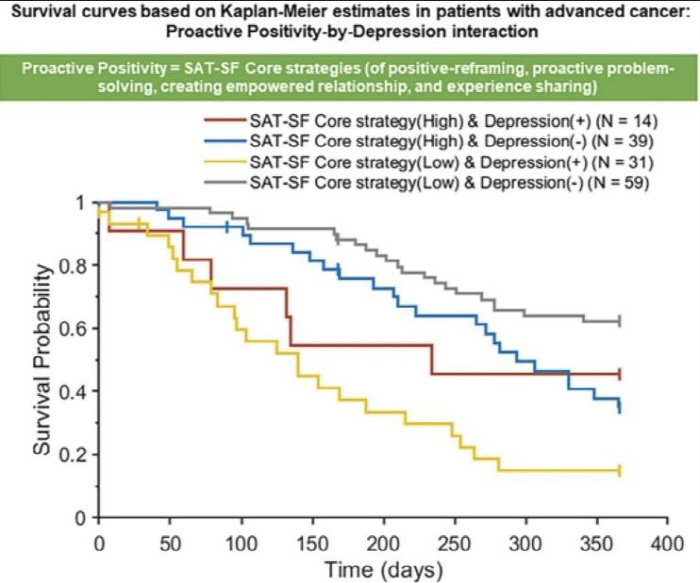Even advanced cancer, even with the same stage, the survival rate varies depending on the coping strategy...4.63x difference in risk of death
|
A research team at Seoul National University Hospital analyzed the effect of the interaction between 'depression' and 'positive coping strategies' on one-year survival rates in patients with advanced solid cancer, and found that patients with low coping strategies and depression had a 4.63 times higher risk of death than the baseline group. This suggests that patients' psychological resilience and active coping strategies may have a greater impact on survival than with or without simple depression.
Professor Yoon Young-ho of the Department of Family Medicine at Seoul National University Hospital (corresponding author), Professor Yoon Je-yeon of the Office of Education and Human Resources Development (co-first author), and Professor Chung Ju-yeon of the Department of Tourism & Wellness at Hankuk University of Foreign Studies (co-first author) announced the results of a prospective secondary analysis of 144 advanced solid cancer patients who participated in early palliative care clinical trials at 12 senior hospitals nationwide on the 19th.
Patients who reach terminal conditions after cancer diagnosis are likely to suffer psychological pain from self-loss, fear of death, and confusion about the meaning of life. In fact, approximately 30% of all cancer patients are known to experience clinically significant levels of depressive symptoms, which can affect survival as well as poor quality of life. The research team tried to empirically investigate how these mental health factors affect actual survival.
The subjects of the study were all high-risk groups that recurred after stage 4 or treatment, and patients with a survival period predicted to be within one year. Patients with various solid cancers such as lung cancer, liver cancer, pancreatic cancer, colon cancer, stomach cancer, and breast cancer were included. The research team evaluated the psychological resilience of patients using key strategy items of the Smart Health Management Strategy Tool (SAT-SF). This strategy consists of ▲ positive reconstruction ▲ active problem solving ▲ experience sharing and relationship-oriented behavior, which is defined as 'Proactive Positivity'. This is an action-based strategy that helps patients reorganize their lives independently without emotionally collapsing in a crisis situation. The research team divided strategy levels based on a SAT-SF score of 66.66 and classified depressive symptoms as moderate or higher depression when the PHQ-9 score was 10 or higher. Physical function assessment used the ECOG-PS indicator.
The research team divided patients into four groups according to the level of positive coping strategies (high/low) and the presence or absence of depression (yes/no), and then compared their one-year survival rates. As a result, the risk of death was 4.63 times higher in the patient group ' with low coping strategies than in the case without depression (aHR=4.63, 95% CI: 2.54-8.43, p<0.001). On the other hand, no significant difference in the risk of death according to the presence or absence of depression was observed in the patient group with high coping strategies.
These results show that the effect of depression on reducing survival rates may vary depending on the patient's level of coping strategies. In particular, in patients with low coping strategies, depression was statistically significantly associated with lower survival rates, but in patients with high coping strategies, the risk of death was not significantly increased even with depression. This suggests that if the coping strategy is low among the advanced solid cancer patients, it is necessary to more closely evaluate the comorbidities of depression and intervene therapeuticly.
On the other hand, the state of physical function also had an important effect on the survival rate. Patients with an ECOG-PS score of 2 (self-management is possible but daily life is difficult) had a 2.33 times higher risk of death than patients with a score of 0 to 1 (HR=2.33, 95% CI: 1.25-4.34, p=0.012). In addition, SAT-SF scores tend to decrease over time, confirming the reality that it is difficult to maintain a positive coping strategy as the disease progresses.
The research team emphasized that how patients perceive and respond to depression itself can be a key factor in determining survival. In fact, patients with high positive coping strategies tended to be less negatively affected by survival even in depression. This supports the need for interventions that increase psychological resilience to improve the survival rate of end-stage cancer patients.
Professor Chung Ju-yeon (Department of Tourism & Wellness at Hankuk University of Foreign Studies) "This study is the first statistical demonstration of the highest risk of death in patients with low positive coping strategies and depression."
Professor Yoon Je-yeon (Seoul National University Hospital Education Human Resources Development Office) explained that "the results showed that mental health interventions that evaluate and improve depression levels and coping strategies together can contribute to improving patients' survival rates."
Professor Yoon Young-ho (Department of Family Medicine at Seoul National University Hospital) "This result is an empirical basis for supporting the results of early palliative care clinical trials published in the past JAMA Network Open from a psychosocial perspective, and suggests the need for mental health interventions based on smart health management strategies."," he stressed.
The study was conducted with the support of the Ministry of Health and Welfare's health care R&D project, the Korea Research Foundation, and the Ministry of Science and ICT, and the results of the study were published in the latest issue of the international journal BMC Psychiatry.
|
This article was translated by Naver AI translator.





